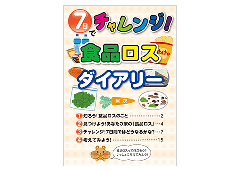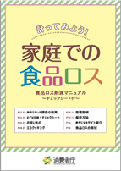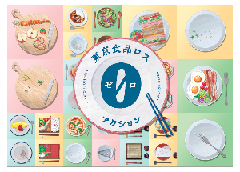Let's reduce food waste!
Update date: June 10, 2022
What is food loss?
"Food waste" refers to food that is still edible but is thrown away as garbage.
In Japan, approximately 60% of food is imported from overseas, but approximately 6.12 million tons of food are wasted each year (Ministry of the Environment: 2017 estimate), of which approximately 2.84 million tons are generated by ordinary households and the remaining 3.28 million tons are generated by food-related businesses.
Regarding food waste, one of the targets of the Sustainable Development Goals (SDGs) set out in the 2030 Agenda for Sustainable Development adopted by the United Nations in September 2015 is to halve per capita food waste worldwide by 2030. Japan has set a goal of " halving food waste generated by households by fiscal 2030 compared to fiscal 2000 levels ."
Let's keep in mind the motto "Don't waste food, waste it once more" and put efforts into reducing food waste into practice!

Main efforts to reduce food loss
Approximately half of food waste occurs at home.
There are three main reasons:
- Direct disposal : The product is thrown away after the best-before/use-by date has passed.
- Leftovers : Food that could not be eaten and was thrown away.
- Excessive removal : Even the edible parts are thrown away during cooking.
Reducing food waste is not only good for the environment, but also for household finances.
Please take this opportunity to practice!
1. Understand expiration dates correctly!
When buying food, we tend to choose items with a long expiry date, but if you need to use them up quickly, why not choose items with a short expiry date?
"expiration date"
``The expiration date for delicious food'' . It is often displayed on foods that can be stored for a long time.
Even if the expiration date has passed, it does not mean that you can no longer eat the food.
Foods that have passed this limit should be judged on an individual basis based on their appearance and smell.
"Expiration date"
``The period when it is safe to eat.''
It is often labeled on foods whose quality deteriorates quickly.
It is safer not to eat anything that has exceeded this limit.
2 Remember to “don’t buy too much,” “don’t make too much,” and “eat all you can!”
If you buy too much food because it's on sale, or forget to check the fridge and buy the same food again, you may end up not using all the food and having to throw it away.
Check your refrigerator, shelves, and other food inventory before going shopping.
You can also reduce food waste with just a few simple ingenuity measures, such as only cooking as much of what you buy as you can eat, using vegetable peels and cores in your cooking, and not peeling food too thickly.
Additionally, we will be posting the "Food Loss Diary" created by the Ministry of the Environment and the Consumer Affairs Agency, and the "Tokyo Food Loss Zero Action" created by the Tokyo Metropolitan Government as content that will enable you to find out about food waste occurring at home, so please make use of them.
For more information, please visit the Consumer Affairs Agency and Tokyo Metropolitan Government websites below.



![]() Challenge in 7 days! Food loss diary (PDF: 11,732KB)
Challenge in 7 days! Food loss diary (PDF: 11,732KB)
![]() Let's measure it! Food loss at home (PDF: 3,458KB)
Let's measure it! Food loss at home (PDF: 3,458KB)
![]() Tokyo Food Loss Zero Action (PDF: 4,645KB)
Tokyo Food Loss Zero Action (PDF: 4,645KB)
![]() Taking action to reduce food waste (Consumer Affairs Agency) (External link)
Taking action to reduce food waste (Consumer Affairs Agency) (External link)
3. Take advantage of food drives!
This is a volunteer activity in which people bring surplus food from homes and businesses and donate it to welfare organizations and facilities.
For details, please see the page below.
The Ministry of Agriculture, Forestry and Fisheries is promoting the donation of unused food to food banks from the perspective of reducing food loss and reducing the burden of waste disposal. We are working to aggregate information on the foods we use and disseminate this information all at once to food banks across the country.
If you are having trouble disposing of unused food, please refer to the Ministry of Agriculture, Forestry and Fisheries website below.
4 Let's practice the "3010 (Sun Maruichi Maru) Movement"!
The "3010 Movement" is a movement that encourages people to eat at their own table for the first 30 minutes and the last 10 minutes during banquets or meals at restaurants in order to reduce food waste.
In addition, the Consumer Affairs Agency, the Ministry of Agriculture, Forestry and Fisheries, and the Ministry of the Environment have created a "Guide to Eating Everything When Eating Out," which we would like to share with you as follows.
Please feel free to use it.
![]() Delicious “eat-all” guide when eating out (PDF: 1,398KB)
Delicious “eat-all” guide when eating out (PDF: 1,398KB)
reference
![]() Food loss portal site (external link)
Food loss portal site (external link)
![]() National movement to reduce food loss (NO-FOODLOSS PROJECT) (external link)
National movement to reduce food loss (NO-FOODLOSS PROJECT) (external link)
![]() Project to eliminate food waste (external link)
Project to eliminate food waste (external link)

Adobe Acrobat Reader DC (formerly Adobe Reader) is required to open PDF files.
If you don't have it, you can download it for free from Adobe.
![]() Download Adobe Acrobat Reader DC
Download Adobe Acrobat Reader DC
Inquiries regarding this page
Inagi City Urban Environment Development Department Living Environment Division
2111 Higashi-Naganuma, Inagi City
Phone: 042-378-2111 Fax: 042-377-4781







